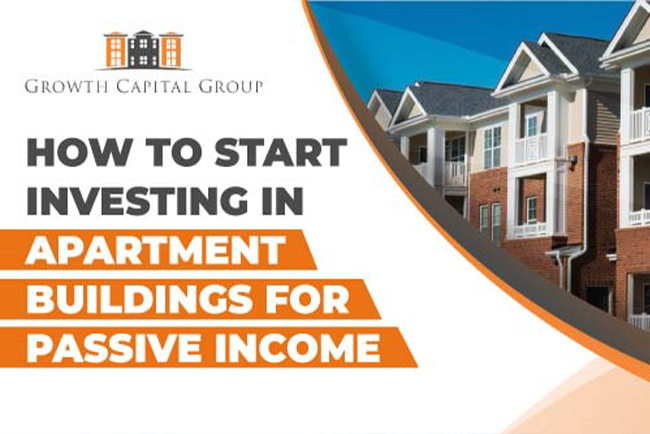Do You want passive income but are unsure about where to begin? Investing in apartment buildings is a wise financial decision that might assist you in building money over time. However, you must first grasp the fundamentals and have a well-thought-out plan before investing.
With the help of this detailed article, start investing in apartment buildings. To build your portfolio for passive income, learn how to make wise judgments, identify properties, and create a plan.
Investing In Apartment Buildings
Real estate investing’s attractive and reliable returns are no longer a secret. You can pick from several investment possibilities today to help you achieve your financial objectives and desires. Investing in apartment buildings for passive income can be a lucrative venture. It requires careful planning, research, and financial analysis.
Apartment complex investing is becoming increasingly popular as people look for a promising asset class that offers less financial risk and a steady, reliable cash flow.
In urban areas worldwide, there is a rising demand for cheap housing. Apartment buildings are ideal for many investors, including busy professionals, medical professionals, lawyers, CEOs, young professionals, and singles who all need a place to call home.
Despite how promising it is, there are a few factors that passive investors should know before investing.
Why Should I Invest in Apartment Building
The advantages of multifamily properties over single-family homes include improved cash flow, lesser investment risk, and the ability to scale up apartment buildings. But that’s only the start! Here are a few more explanations for investing in apartment buildings.
- High Demand for apartment homes
- Strong and Stable Cash Flow
- Scalable Property Management
- Forced Property Appreciation
- Tax Advantages
- Create Generational Wealth
How To Start Investing In Apartment Buildings
To get you started on learning the formula for apartment investing, we’re going to go over some secrets to creating significant cash flow in the apartment complex market. Understanding the approach to accumulating seven-figure wealth through real estate investing is essential.
Here are some tips for how to start investing in apartments:
- Know Your Goals
Before even thinking about what kind of property you want to buy, it’s essential to have your goals clearly defined so that you can determine your investment strategy. If you want passive income, look at properties with high rents and low turnover rates (good for cash flow). If you want growth potential, look at properties with high appreciation rates and strong rental demand from local job growth and college enrollment trends (suitable for capital appreciation).
There are many different strategies when it comes to investing in apartment buildings. However, most investors have a specific goal to maximize their returns on investment (ROI) when buying a property. Here are a few common goals:
1. Cash Flow – A cash flow strategy ensures that the rental income covers all expenses and provides positive cash flow each month. This allows you to pay yourself back over time rather than selling the property immediately or borrowing more money to cover expenses during tough times.
2. Value Appreciation – The value appreciation strategy focuses on finding properties that will increase in value over time through the appreciation of real estate prices, not increasing income from renting apartments.
3. Rental Income – This strategy focuses on maximizing rental income by finding high-demand areas where rents are rising quickly and building up enough equity in your portfolio to take advantage of these trends by selling one or more properties at once or using them as collateral for further borrowing against them.
- Syndication:
Syndications raise money from investors wanting to play a passive real estate investment role. In this scenario, the person in charge of the syndication would be in the order of all meaningful choices about the selected apartment complex. You must add your funds to the collection to benefit from future gains.
- Real Estate Fund:
On a broader scale than syndications, real estate funds are similar. However, these funds frequently require more extensive minimum commitments and make many real estate investments at once. Additionally, you might not know how your money is being utilized, so learn as much as possible about a fund before investing in it.
- REITs :
An organization that handles real estate investments, which frequently include apartment buildings, is known as a REIT. Similar to purchasing shares in any other firm, you are investing in the company when you invest with a REIT. Real estate investment trusts are a great way to invest.
- 1031 Exchange :
A 1031 exchange is a tax-deferred exchange of a property for an equal or more excellent value. It allows you to sell one property and purchase another without paying taxes on the sale of your old property, as long as you reinvest the proceeds in real estate within 180 days. The money you receive from selling your old property goes into an exchange account, which is used to purchase a new property within those 180 days.
Read More: Benefits of Investing In Multifamily Real Estate
Final Thoughts
Apartment complex investing is a significant undertaking that, when done well, may bring in sizable financial returns and even generate a stable passive income for you.
However, it is advisable to work with experienced syndicators if you want to create a passive income stream and benefit from portfolio diversification with this valuable asset class without having to take on the responsibility and time commitment of managing it yourself.
Related How Do You Find A Passive Real Estate Investment Opportunity?
Schedule a Free Strategy Call with Us if you’d like to learn more about how to create passive income streams by investing in multifamily real estate. Growth Capital Group is here to help you achieve your investment goals today.

